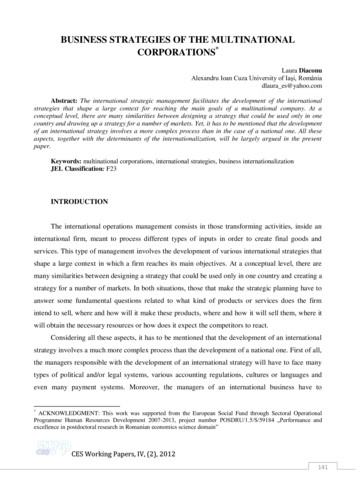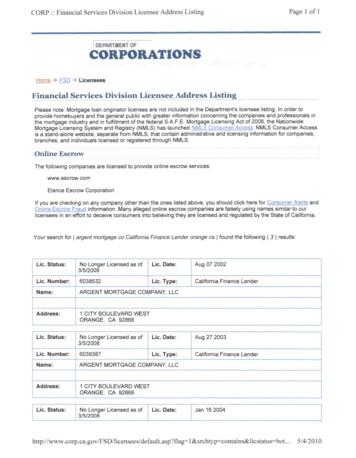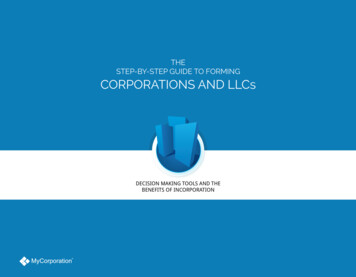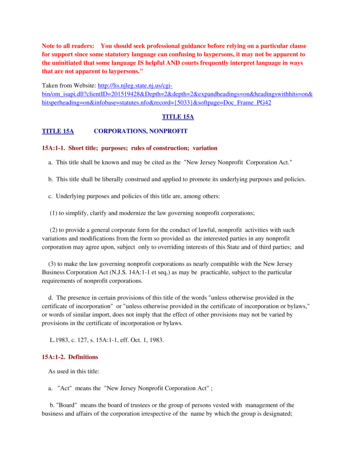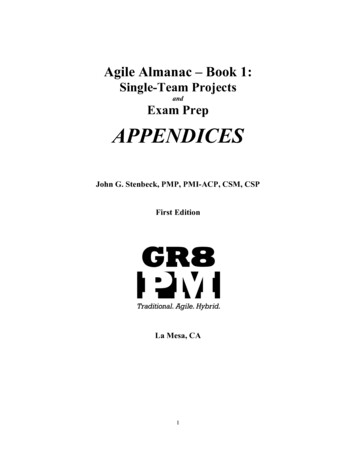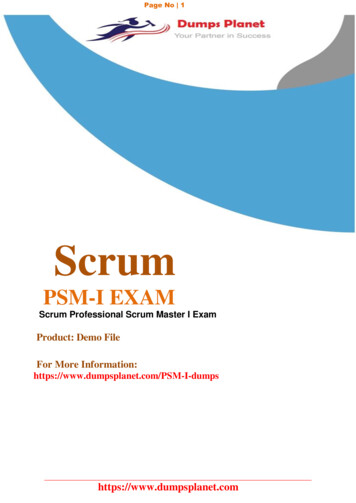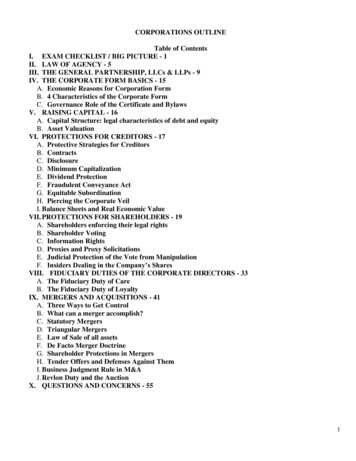
Transcription
CORPORATIONS OUTLINETable of ContentsI. EXAM CHECKLIST / BIG PICTURE - 1II. LAW OF AGENCY - 5III. THE GENERAL PARTNERSHIP, LLCs & LLPs - 9IV. THE CORPORATE FORM BASICS - 15A. Economic Reasons for Corporation FormB. 4 Characteristics of the Corporate FormC. Governance Role of the Certificate and BylawsV. RAISING CAPITAL - 16A. Capital Structure: legal characteristics of debt and equityB. Asset ValuationVI. PROTECTIONS FOR CREDITORS - 17A. Protective Strategies for CreditorsB. ContractsC. DisclosureD. Minimum CapitalizationE. Dividend ProtectionF. Fraudulent Conveyance ActG. Equitable SubordinationH. Piercing the Corporate VeilI. Balance Sheets and Real Economic ValueVII. PROTECTIONS FOR SHAREHOLDERS - 19A. Shareholders enforcing their legal rightsB. Shareholder VotingC. Information RightsD. Proxies and Proxy SolicitationsE. Judicial Protection of the Vote from ManipulationF. Insiders Dealing in the Company’s SharesVIII. FIDUCIARY DUTIES OF THE CORPORATE DIRECTORS - 33A. The Fiduciary Duty of CareB. The Fiduciary Duty of LoyaltyIX. MERGERS AND ACQUISITIONS - 41A. Three Ways to Get ControlB. What can a merger accomplish?C. Statutory MergersD. Triangular MergersE. Law of Sale of all assetsF. De Facto Merger DoctrineG. Shareholder Protections in MergersH. Tender Offers and Defenses Against ThemI. Business Judgment Rule in M&AJ. Revlon Duty and the AuctionX. QUESTIONS AND CONCERNS - 551
I.EXAM CHECKLIST / BIG PICTUREA. Answering questions1) Disclosure? and Fraudulent Conveyance Act?2) Tie together the procedural aspects of shareholder litigation with the substantive duties ofthe directors in a given issue spotter. – GO THROUGH THE STEPS!!!a) What legal wrongs are there? - Identify the claim of the creditor or shareholderi. Mergers & Tender Offers(1) If you don‘t like a merger, then you can just sell the stock. Otherwise, 2 options:a) you try to generate some enthusiasm to get others to vote against,b) you get an appraisal remedy.(2) Look at the Williams act tender offer regulations as the first step in a seriesof responses to defend against takeovers.(3) In Weinberger, you need entire fairness whether there is a conflictedtransaction. The burden is on the self-dealing defendant who has to show thathe was dealing fairly. So, class action suit is more attractive than the appraisal.THAT SHOULD BE MENTIONED IN THE EXAM.(4) Unocal ask 1) is there a legitimate threat? 2) was this a reasonable response?(5) Revlon means in any change of control, or break up, or sale of assets, there is aduty to try to get the best price.(6) Time-Warner means you can have a strategic vision and opt not to sell at all, youcan take defensive measures to defend that strategic vision. Passes Unocal anddoesn‘t trigger Revlon because there was no change in control.a) What if its stock for stock where one is very huge and one is verysmall? That’s unresolved, but some people say Revlon(7) QVC says that SHs should get a premium for giving up control, and distinguishesTime-Warner. Here, triggers Revlon because they‘re going to sell to Viacom. Nostrategic vision argument because they are selling their ability to make corp policy(8) DGCL §203. Business Combinations with Interested Stockholdersa) if you do a tender offer and you get more than 15% and less than 85%of the stock without board approval and you do a second stageapproval to go private, you have to get a 2/3rd supermajority vote.b) The corporate charter can elect not to be subject to this rule.ii. Insider Trading(1) Is it material(2) Is there a duty to disclose?(3) Is there a continuing pre-existing buying pattern? does that constitute a purchase?(4) Did they actually use the information?iii. Proxy misstatementsiv. Loyalty Issuesb) Identify the procedural mechanism for bringing suit – who is the right π?i. Appraisal(1) Three Steps in a Delaware Appraisala) Preserve the Appraisal: §262(d)(1) says that you have to preserve theright to appraisal before voting on the merger.b) Exercise the right to Appraisal: §262(d)(2) says that if the merger isapproved, you notify the board that you want an appraisal.c) Bring the Appraisal: You then have to bring it to court to get the courtto appraise the shares.2
B.C.D.E.ii. Derivative – If Derivative, then go through demand motions.(1) Pre-Suit Demanda) Raise the issue of whether or not there is a reasonable doubt about theboard‘s ability to respond to a demand before a derivative suit.b) By making the board demand, you concede board independence.(2) Must have a stake in the company at the time of board action.(3) Attorney‘s fees & Indemnification for directors?iii. Class Action: Common facts and question?c) Is this suit worth pursuing?i. Recissory damages, if there is a breach of fidu duty, then you get the transaction isvoidable, and you get the value as if the transaction never happened.3) Proxies & Votinga) SEC regulates proxy voting. There are rules, its not nam. Especially about false statements.4) When a lot of SHs accept a tender offer, it might make sense to just swallow the pill?5) You cant issue a new class of stock without modifying the charter requires SH approval.6) Modifying the charter requires board initiation and SH approval. By-laws, can be done by either?Shareholder Rights1) §211: Elect the board2) §141(k): Remove directors3) Vote on some mergers4) Right to vote on sales of all assets5) Right to vote on amendments to charter6) Vote on dissolution of companyTime Value of Money1) PV of a promise to get 1.10 in 1 year with DR of 10% 1.10 / 1.10 12) PV of a promise to get 1 in 10 years if dr is 10% 1 / (1.1 10) 0.39Protections / Inducements for Risk-taking for Directors1) D&O Insurance2) Indemnification3) Business Judgment Rule4) § 102(b)(7) p. 163 supp5) Performance pay: stock optionsRecurring themes1) As corporations are less constrained than they were in the 19th century (ultra-vires), the duty ofloyalty becomes more important: higher agency costs, because agents are freer to do more.2) courts are not good at finding fair prices, but are good at finding fair process. so they look forways to get comfortable with these transactions. so we start with the legal test of entire fairness. theyhave an obligation to show its fair. so even a transaction by one director in a little piece of business,he has to show its fair.3
II. LAW OF AGENCYA. Agency Cost1) Agency cost theory – agents maximize own wealth not that of investors – costs arise whenincentives of agent differ from those of principal, since they are doing what is best for them, and notthe principal. –3 sources of agency costsa) Monitoring – ensuring loyalty of manager(s)b) Bonding – manager(s) demonstrating loyaltyc) Residual costs – any other costs2) 3 Problems with Agencya) Conflict between manager(s) and principal(s)b) Maj. shar.‘s discriminating against minority shar.‘sc) Third parties acting opportunistically3) 3 Legal Techniques for limiting thesea) Voting rights – doesn‘t work completely b/c shar. passivity but makes takeovers possibleb) Selling – makes takeovers possiblec) Suing – derivative suits, etc.4) More competitive market less agency costs5) Explicit costs (such as advertising) vs. implicit costs (such as the value of time).B. Two questions:1) Was there an agency relationship?2) What is the scope of authority under the agency?C. Forming an agency relationship:1) Control is an important part of the agency relationship.2) A reasonable understanding of the words or actions of the principal from the agent’s point ofcan create the agency relationship. There is no requirement for a writing or seal.3) Jensen v. Cargill: we see that the courts can interpret something as an agency even when neitherparty would characterize it as such.4) Humble Oil & Refining Co. v. Martin (Tex. 1949) p. 30: Δ liable b/c operator was an agent.Someone parks a car in the gas station and it rolls off and hits pedestrians. Humble has anindependent contractor relationship with gas station operator, but court says that this is an agencyrelationship, not independent contractor. In fact, Humble owns the property. The court says that it isas if Schneider was a store clerk, or an employee, not in his own business. Humble is liable then.5) Hoover v. Sun Oil Co. (Del. 1965) p. 32: Sort of the same as Humble case, only different result.The court says that this guy is more like an independent outfit that happens to sell Sunoco products.There was less control, no day to day decision making by Sun, and a different lease arrangement,more like a contract.6) In a contract, they can’t say something isn’t an agency relationship in the K when it mightaffect 3rd parties. the court will find how they want and not be told how to find.D. Scope of agent’s authority1) Actual authority: delegated by the principal (judged from perspective of reasonable A);a) Express authority – A‘s authority stated explicitlyb) Implied authority – what A reasonably believed that P meant when authority delegated2) Apparent authority: authority that P never meant to give but that a 3rd-party would reasonablybelieve A had (judged by the acts of a reasonable 3rd party)a) Required: Third person reasonably believes agent is acting on behalf of principal.b) Black letter law: not reasonable for 3rd-party to rely on the statements of an A as a basis toestablish the authority of the agent (need contact w/the P)i. Two reasons for variations: intuition of fairness and idea of ex-ante efficiency4
c) White v. Thomas (Ark. App. 1991) p. 22: Agent can‘t just claim authority and go ahead andthe 3rd party can‘t just rely on A‘s verbal warranty of authority. The Agent bid too high on aproperty then sold land to someone else w/o authorization.i. White gives A authority to bid not more than 250,000 on a property. She overbidsthough, freaks out, and then tries to sell some of the 217 acres to the Thomases. WhenMr. White finally hears about this, he doesn‘t want to honor the sale contract for 45acres to the Thomases. The Thomases then sue Mr. White.ii. The lower court said this was all one act and if White wants to take the purchase, he has totake the sale too. The appeals court says its two different things.iii. If the Thomases had more reliance, the court might have found the other way.d) In corporate practice, there aren‘t many questions of authority. The authority of every officerin a corporation is established by a board.3) Inherent power (‘incidental authority‘): situations w/no actual or apparent authority:a) R§161 [20]: General A for disclosed/partially disclosed P subjects P to liability if other partyreasonably believes A is authorized (e.g., other similar As would be authorized) and has nonotice that A is not authorized.b) R§161(a): Special A for disclosed/partially disclosed P, A has no power to bind P by s orconveyances if not authorized or apparently authorized unless P is estopped or unless the A‘sonly departure from given authority is for [examples]c) R§194 [11]: General A for an undisclosed P authorized to conduct transactions subjects his Pto liability for acts done on his account, if usual or necessary in such transaction, althoughforbidden by the P to do them.d) Gallant Ins. Co. v. Isaac (Ind. App. 2000) p. 26: Δ bought a new car and wants to switch autoinsurance to the new car from the old car. Insurance agency says to come in on Monday topay for it, but in the meantime, she crashed the car. The insurance company denies the claimbecause she hasn‘t paid for the policy yet and the broker only had authority to make insurancecontracts when it is paid. So there is no actual authority.i. But the pattern of conduct was usually beyond the actual authority. You might ask, did Δact reasonably and did she detrimentally rely? (Apparent authority)e) NOTE: in the third restatement, they got rid of this idea and replaced it with estoppeland restitution doctrines.f) Restatement §205 (3d?): Estoppel to Deny Existence of Agency Relationshipi. Where P has not given an A authority, they are only liable if: (1) Pintentionally orcarelessly caused reasonable belief of A‘s authority; or (2) having notice of the belief, Pdid not take reasonable steps to notify them of their mistake.4) is an undisclosed principal ever liable?a) if the contract is in the scope of Agent‘s authority, he is ALWAYS liable.b) if you‘re an A, and they think you are the principle, then you‘re liable.5) is a partially disclosed principle every liable in a K? §§144,186 in the restatementE. Torts in agency1) If within the scope of the agency, then the P is liable.2) But if outside of the scope of the agency, then P is not liable.3) Restatement (2d) Agency §220. Definition of Servant (p.13 supp.):a) lists factors in determining whether someone is an employee or not.b) Note that this list is not in the 3rd Restatement.4) 2nd Restatement of Agency § 228. General Statement. defines whether something is within thescope of employment. p. 14 of supp. Or see § 7.07 of 3rd Restatement. Employee Acting WithinScope of Employment. p. 35 of supp.5
5) Policy: The person who controls the situation, is the person who gets incentives to prevent torts.So, if its an agent doing agent work, then its P who is liable. if its someone doing their own thing,then it is the actor who is liable.F. Agency Termination: we usually say that you can terminate an agency at any time. but if youragreement is that it goes on for one year, maybe the fired agent can sue for contract breach. but whatwould the damages be? there is no good or easy answer here.1) P will make the argument that he couldn‘t trust the agent to perform his fiduciary duties.2) if the P (P principal) cancels the agency, the agent continues to work though, and makes acontract on P‘s behalf, but P likes the contract, even though he fired A, can he enforce the contract?a) in that case, if enforced, there would be a one-way right for the P to sue the 3rd party forenforcement, but the 3rd party couldn‘t sue him for enforcement, which the court isprobably
1) As corporations are less constrained than they were in the 19th century (ultra-vires), the duty of loyalty becomes more important: higher agency costs, because agents are freer to do more. 2) courts are not good at finding fair prices, but are good at finding fair process. so they look for ways to get comfortable with these transactions. so we start with the legal test of entire fairness. they
